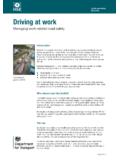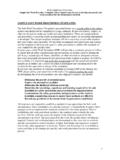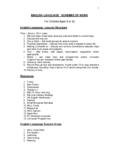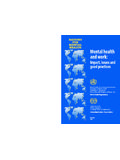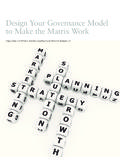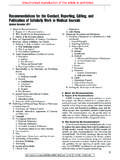Transcription of Abstracts Social Work Thesis Research Graduate …
1 Abstracts Social work Thesis Research Graduate School of Social work , Addis Ababa University July 2006 1st MSW Graduating Class To obtain further information, contact Abebaye Hailu Ergete. (2006). Role of Faith Based organizations in Combating HIV and AIDS Epidemic in Addis Ababa: Case Study of Ethiopian Kale Heywet Church. Advisor: Professor Sandhya Joshi. Abstract. The emergence of HIV/AIDS epidemic has brought multi faceted challenges among the entire nations across the world. Particularly, it has affecting the developing countries human and material resources with retarded socio economic growth.
2 In Ethiopia millions are infected and affected and suffering with result of huge impacts. This study tries to see the role of Faith Based Organizations (FBOs) played in fighting against HIV/AIDS in Addis Ababa. It focuses on case study of Ethiopian Kale Heywet Church (EKHC) MEDAN ACTS Addis Ababa HIV/AIDS project in Kirkos sub-city. The study set out objectives and used qualitative methods and selected 25 samples using random sampling technique among 250 beneficiaries. The data sources are interview of beneficiaries, key informants interview of church leaders, Junior Secondary Schools directors, Iddir leaders, project manager and senior project staffs like IGA officer.
3 The Thesis examines the involvement of FBOs in the prevention and control of HIV/AIDS in the past decades. Few literatures indicated that major religions organizations have played positive role in fighting HIV/AIDS including EKHC. EKHC has various departments working on different development issues including prevention and control of HIV/AIDS. Under EKHC intervention of HIV/ AIDS program indicate that the church has big share to combat HIV/AIDS. The Thesis found that the majority of the respondents faced different challenges such as stigma, shelter problem, shortage of food and lack of medical treatment. Thus, the findings insist to give recommendations to service providers, humanitarian organizations, FBOs, policy makers and other associations working on HIV/AIDS to be involved actively in bringing effective and better performance to fight HIV/AIDS epidemic.
4 Abebe Assefa Abate. (2006). Life Skill and its Contribution to Competent Workforce Development: The Case of Sociology and Social Anthropology and Psychology Undergraduate Students in Addis Ababa University. Advisor: Professor Alice K. Johnson Butterfield. Abstract. Undertaking major investment in education to achieve rapid economic growth that will enable poor people to be the beneficiary has been taken as one of the means for Ethiopia to relay on. However, the links between policies and practices are not yet harmonized. This is mainly because of the lack of integration of life skill development, which includes value, identity and interpersonal development components with the intellectual development programs in the higher education system.
5 This Research therefore assessed the contribution of life skill to competent workforce development using both student survey and employer s key informant interview. The Research findings indicate the lack of life skill development survives in the university system on the one hand and the existence of informal services that have been influencing student s life skills in the university on the other hand. Accordingly, the contribution of friends, relatives, 1 religious leaders and politician to help students learn some of the life skills while attending their study in the university are found to be the four top influential bodies.
6 Aissetu Barry Ibrahima. Parents and Children in Empty-Shell Families: A Case Study on Selected Families in Addis Ababa. Advisor: Professor Sandhya Josh Abstract. Empty-shell family is a family setting where couples have no more sexual and emotional ties while they are still living together under the same roof with their children. This Research is a case study that incorporates 15 individuals who are from five families, five couples who are parents and five children. The Research tries to assess the causes that prompt families to be an empty-shell and consequences of being in empty- shell families on parents and their children.
7 Furthermore, the underlying reasons why parents choose to stay in empty shell families are assessed and the implication of Social work for empty-shell families is identified. This paper has also taken into consideration the ethical and cultural issues. Andom Gessese Kassahun. Strengths Approach for Community Livelihood Building Among Poor Women in an Urban Context in Ethiopia: A Study on Female Headed Households in Arada Georgis, Addis Ababa. Advisor: Professor Alice K. Johnson Butterfield. Abstract. It is assumed that human strengths or human capital is significant in building community livelihood in an urban context.
8 However, available information indicates that this strength is unable to be converted into money for better lives rather hidden in poverty. Absence of Research specific to strengths in the Ethiopian context is thought to be one cause. The purpose of this study is, therefore, to analysis strengths [skills, ] approach for community livelihood building among female headed households (FHHs) in an urban context and in addition a gap in Research would be minimized. To this effect, primary data was collected through in-depth interview of fifteen cases by taking five from each of the following categories: successful; unsuccessful and their adult children.
9 The same was brainstorm and supported by statistical data from skills inventory survey of 100 FHHs. In addition, key informants, direct observation and literature review methods were also used to increase the validity and reliability of the data collection process and its outputs. This study finds that poor FHHs are endowed with a minimum of six indigenous skills and capacities or human capitals. However, some skills mobilized/utilized for enterprise making while others are not. In this regard, due to different reasons, there is a different among successful and unsuccessful cases in utilizing these strengths into income generating activities.
10 The lack in mobilizing, utilizing and transforming these strengths is not limited only to beneficiaries rather local development partners and adult children gave less attention in mobilizing and utilizing these human capitals. Existing practice in applying strengths approach for community livelihood building is found limited. However, this Research outputs supported this approach has comparative advantages if it is given priority attention as major means and tools to bring change on the life of urban poor in the Ethiopian context. Strengths approach implication on Research , policies/strategies, and actions and on Social work application has also discussed in detail and some recommendations are forwarded.
